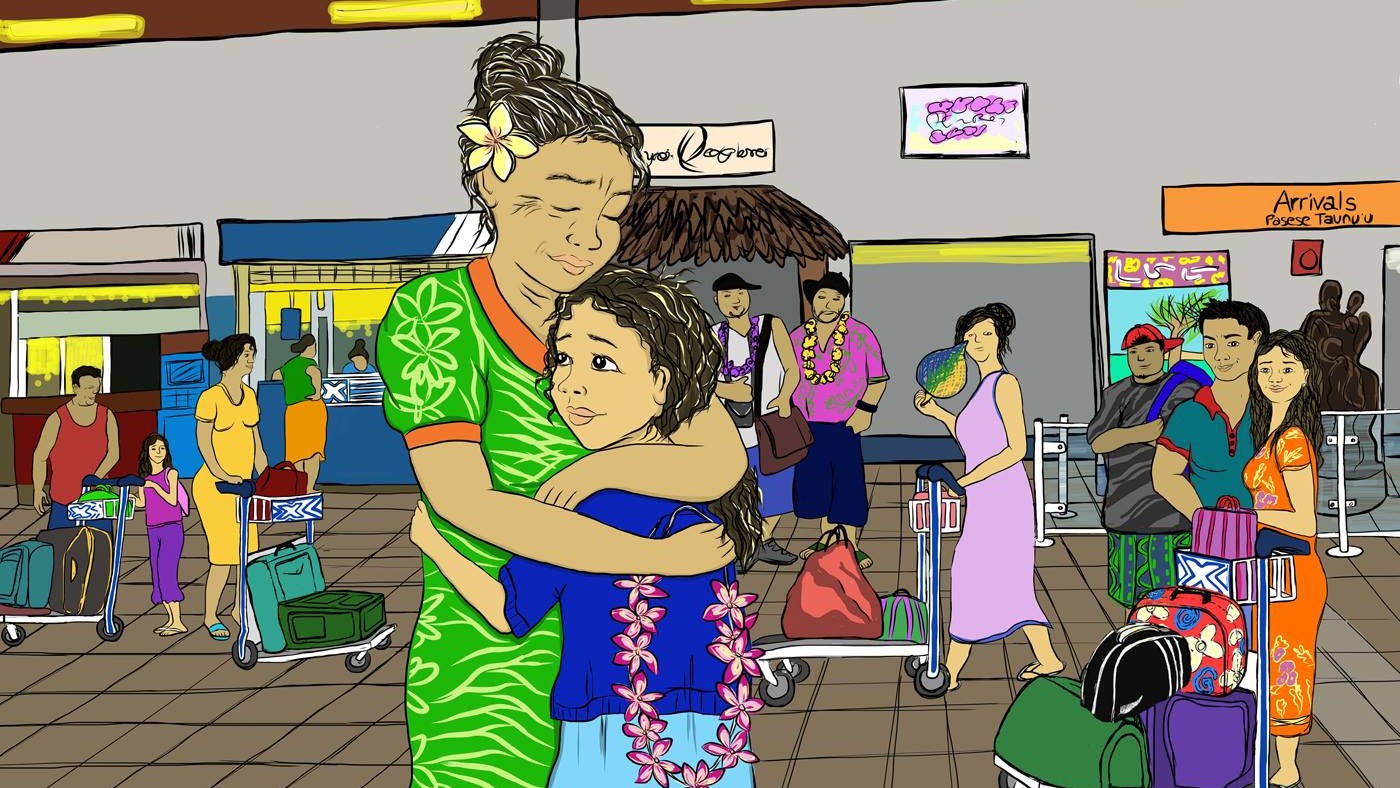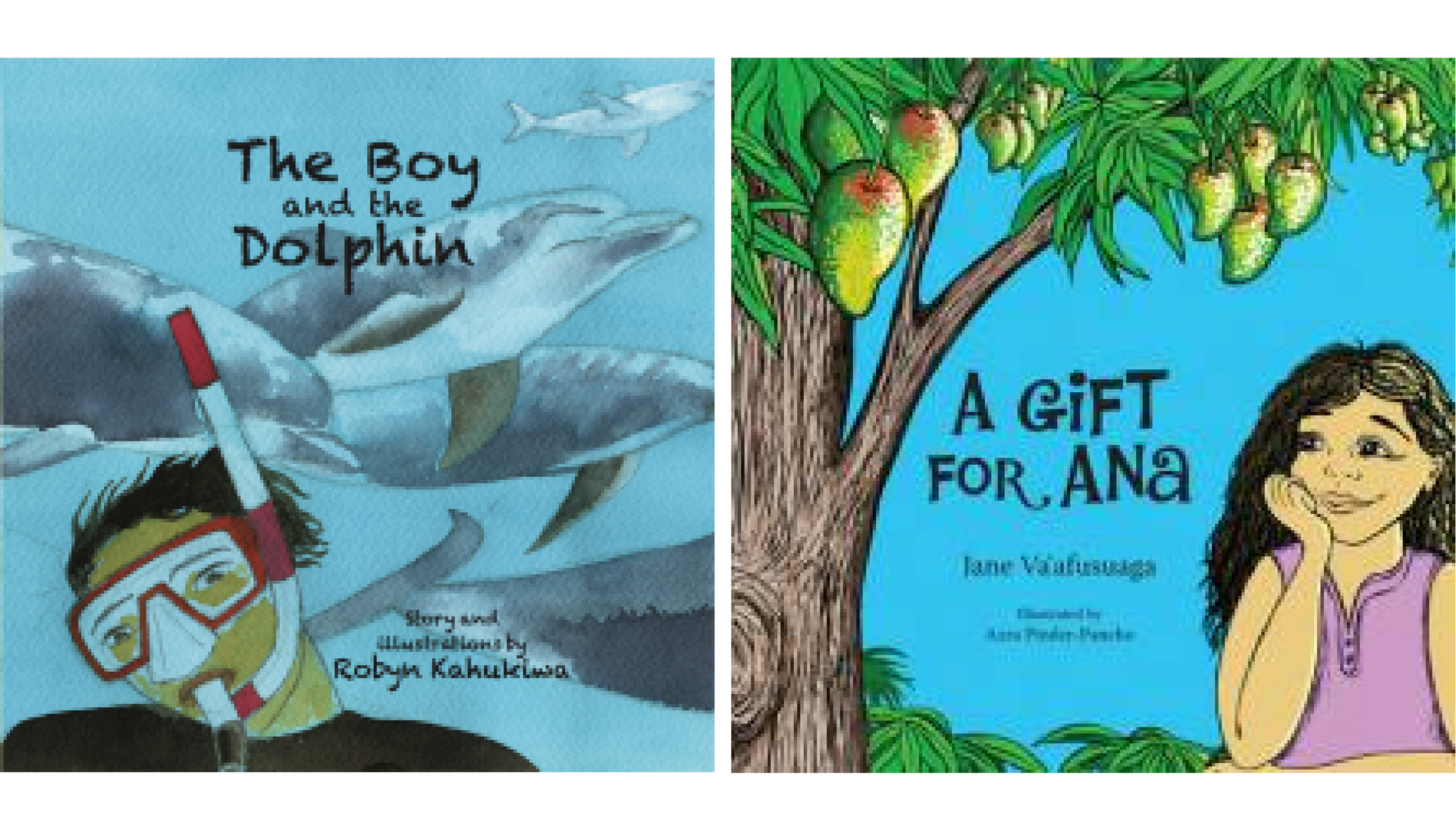Happy 10th Birthday to Little Island Press! In celebration of this anniversary, Auckland teacher, writer and mother Emmaline Matagi sat down with co-founder Evotia Tamua, to hear about Little Island’s journey of connecting books and communities.

I was born in the Fiji Islands. I had a wonderful childhood there, thanks largely to my beautiful Grandmother and her skill at making something out of nothing. We grew up poor in material terms but very, very rich in love.
I grew up in a strict Methodist household and so the first book I learnt to read as a child was the Bible, the only book read to me as a child. The next was a book about a war in a far away place with people who had funny names like Gertrude and Victoria.
My uncles, still young bachelors living at home, were avid readers, and had chapter books everywhere, but I never had the privilege of picture books. I sure as heck never saw any little brown girls in the islands in a book. I saw my first picture book when I was about nine years old and went to a library in New Zealand for the first time.
I never had the privilege of picture books. I sure as heck never saw any little brown girls in the islands in a book.
This is why it is so exciting for me to see my own children reading picture books from birth, then reading them to each other, and talking about them in depth. Best of all, I can watch their reactions to picture books from the Pacific. Books that have little brown children in them, books that show island life and give them a reflection of themselves. Thanks to Little Island Press I will be able to see more of these reactions from not only my children but the many beautiful brown children I teach as well.
Little Island Press is a small Auckland-based publishing company run by Evotia Tamua and Tony Murrow, known for books such as A Gift for Ana, The Boy and The Dolphin, Talanoa: Four Pacific Plays, Tales of Niue Nukututaha and more. As you can probably tell from these titles alone they are champions of our Pacific stories. Not only that but their business model is such that they do some pretty impressive digital work for international businesses and use this income to fund the publishing of our Pacific stories.
I recently had the pleasure of speaking to Evotia Tamua, one of the driving forces behind Little Island. She is a strong, kind and intelligent woman who was born in Samoa and raised in Central Auckland. Evotia has a very gentle aura about her which I believe comes from the core of who she is. A woman of Salelesi, a small village where cell phones don’t work – except sometimes behind the minister’s house – and life is a lot simpler. When you speak to Evotia you can feel her love for her Island but also for Auckland; she speaks about her parents and their desire for their children to have a good grasp on their heritage as well as their life in New Zealand. It is this desire that has helped Evotia become the completely grounded Samoan woman you meet, yet at the same time the driven business woman working from her office in Auckland’s CBD.
Evotia attributes much of Little Island’s success as a business to the vision and values she and Tony share. They both believed in the need to produce books for Pacific Island audiences and a Pacific Island market. Both wanted a way to produce books that were both available now and also sustainable for the future.
‘There is nothing worse than someone making an amazing resource or book and then looking for it later to find out it is no longer published. This is something really important to us. Sustainability and availability of our books.’ Evotia explains that Pacific readers may not buy books when they first come out, but years later. Little Island makes sure the books will still be there.
‘There is nothing worse than someone making an amazing resource or book and then looking for it later to find out it is no longer published. This is something really important to us. Sustainability and availability of our books.’
One of the core founding principles of Little Island is about giving a voice to communities, beginning with the Pacific Island community, and extending to others in the future. A Gift for Ana by Jane Va’afusuaga is a beautiful story about a young Samoan girl visiting Samoa, and meeting her grandmother. Azra Pinder-Pancho’s illustrations take you right to the islands, through details like the shapes of the trees. Jane is a Palagi woman married to a Samoan man. They run an eco-tourism business in a remote village in Samoa, living a Samoan life with their Samoan children. Azra Pinder-Pancho is an Auckland-based Filipino artist who Evotia has known for many years. Together they worked on ensuring that the illustrations matched the story and felt authentically Samoan.

I asked Evotia how she feels about authenticity when it comes to Pacific people telling Pacific stories.
Evotia makes the point that there are many people behind the authors and illustrators. For example, Jane has a whole Samoan family to look over her work with an eye for accuracy; she has Evotia and her entire Samoan family, plus various other Samoan readers they test the story on. There is a lot of consulting which occurs before a story is published and it is a long process in order to get the right details within both the story and the illustrations. Little Island want to ensure authenticity for our Pacific community and this is why the process exists.
Evotia also holds the belief that if people are coming from a good place with the right intentions and are willing to take on all the feedback from the community of the culture they are writing about and for, and make necessary changes, then that is fine.
With the new journey of publishing picture books Evotia was expecting a good buy-in from the younger Pacific audience in New Zealand, but she has been surprised at the strong response from Samoa itself. Teachers there are crying out for more stories like these and Evotia is determined to publish more Pacific stories for Pacific children.
Little Island wants children to see themselves as characters in children’s literature.
The second picture book that Little Island has published is The Boy and the Dolphin, written and illustrated by Robyn Kahukiwa. It is a bit of Kahukiwa magic, everything you would expect from Robyn and more. This book is available in Māori and in English, and tells the story of a resourceful boy who saves a dolphin, and their relationship as the boy grows up. It’s wonderful to see books that aren’t just a generic story being translated into Māori but a specific story about Māori children being translated into their own language. It gives that ownership back to tangata whenua and is a beautiful gift in itself.
Evotia is committed to giving each Pacific culture its own space, rather than creating a generic Pacific story and then translating that into Samoan, Fijian, Tuvaluan, Māori and so on. She doesn’t want to contribute to the homogenising of all of our cultures. With this in mind she is very careful about the translations.
Giving children that sense of belonging and love is something that they are proud of at Little Island and they should be. It is no easy feat to get a Pacific story written, let alone have one written, illustrated, printed, distributed and received with such love and success.
Ten years is a long time to be successful in small business in New Zealand, and it has not always been easy for Little Island. Evotia says, ‘There have been many nights where I have lain in bed thinking, gosh, I hope we get paid by this business, or how are we going to pay the rent next month or the wages?’
Little Island has four more picture books coming out by June 2018: two more by Jane and two others by different Samoan authors. Evotia explains that Samoans have been the most willing to share their stories and make them public. There have been many writers recommended to Evotia by word of mouth from different Pacific nationalities. Once she approaches them or sends word to them that she is interested in publishing what they have to offer, they shy away. Our Pacific writers are also fiercely protective of their stories. This isn’t the least bit surprising considering how often things are taken without respect. There is something precious about our words and our stories that we have a huge pride in. It’s like your baby and all you want to do is keep it safe from harm.
Little Island would love more Pacific stories from other Pacific nations and Evotia encourages all Pacific writers to get in touch and get the ball rolling. There is something to be said about ensuring we tell our own stories. If we don’t, someone else will and they probably won’t get them right. There is nothing to be gained if we continue to be our humble Pacific selves and not share our stories our way. It’s time that we let our babies out into the world to shine and grow the way we want. Not just be stolen from us and given different names and used to make money for people who may not have the best intentions.
Little Island would love more Pacific stories from other Pacific nations and Evotia encourages all Pacific writers to get in touch and get the ball rolling.
If this doesn’t encourage more Pacific writers then Evotia has a message that there is good money to be made being a Pacific picture book author. Take the leap!
Please, do it for my children, your children, your nieces, nephews, grandchildren and all the beautiful children going through school and getting an uplifting little surprise when they are in their libraries and see themselves on the cover of a picture book, or inside the pages.
Do it to see their faces light up and hear their excited squeals as I have: ‘Mama look she has hair like mine, I know where she is, it’s Samoa! I’ve been there mama, LOOK!’ Take the leap, because our babies deserve to feel like they belong.
Emmaline Pickering-Martin
Emmaline Pickering-Martin is a Māmā and a writer based in Tāmaki. She holds a Masters degree in Pacific Studies and works for Waipapa Taumata Rau as the Pacific Media Advisor and E Tipu E Rea Whānau Services as the Policy and Advocacy Lead.



